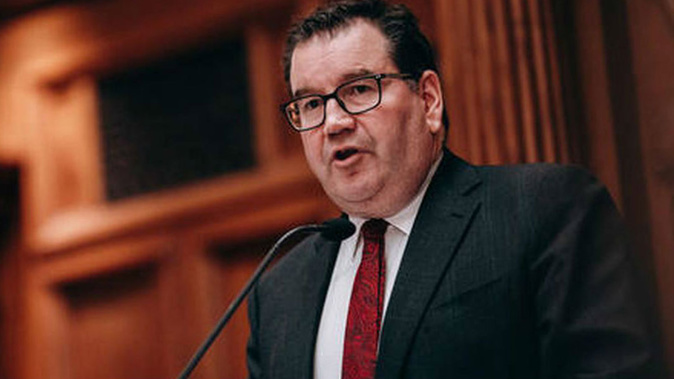
More than 400 businesses have put their hand up for the Government's self-isolation trial - well in excess of the 150 slots available, deputy prime ministry Grant Robertson has revealed.
Robertson was interviewed by NZME Managing Editor Shayne Currie this morning after the Herald released its annual Mood of the Boardroom report which takes in the views of more than 150 top chief executives.
The survey found many business leaders were losing their faith in the Government's Covid response with criticism of the lack of details, targets and dates and a belief the Prime Minister Jacinda Ardern's honeymoon period had soured.
Robertson said he was not sure the Government had ever felt the honeymoon period from business.
"I'm not sure we ever felt the honeymoon period from business to be honest with you but look clearly we are in very challenging times here."
He said he had two main take-outs from the report - one of resilience and the other of frustration from business leaders.
"The New Zealand economy has been incredibly resilient over the last year and a half and while we are in a challenging period at the moment with this particular set of restrictions we have got we do need to take a moment to realise the New Zealand economy has performed incredibly well compared to the rest of the world but even on our own terms."
Robertson said he also understood the frustration that businesses were feeling.
"I absolutely get that. Everybody wants to be able to move forward as quickly as we possibly can but as everybody knows the virus is tricky and difficult and we have to be careful and methodical in what we do to make sure we don't lose all the gains from last year but that we do make progress."
He said Covid didn't operate to a timeline.
"It is ideal in any situation to say this will happen on this date and this will happen on that date but that has not been our experience with Covid."
Asked if Auckland could be stuck in alert level 3 for another eight weeks Robertson said the four to eight week guidance which Director-General of Health Ashley Bloomfield had given was based on modelling for how long it would take to get the country to a 90 per cent full vaccination rate.
"That shouldn't immediately be connected to everything in Auckland and we will make some further announcements about the shift in framework in the next couple of weeks."
A year ago the Government faced a lot of criticism for not listening to business. In recent weeks business leader Sir Ian Taylor has been calling for the Government to tap into the skills and innovation from the business sector by allowing it to come off the bench for the team of five million.
Robertson said it was listening and consulting with the business community although it may not aways agree with its suggestions.
"We are having very regular conversations with business about a range of elements of how we are managing covid."
Robertson said he had a great deal of respect for Sir Ian and had read his ideas for how businesses could get staff across the border to enable more face to face meetings.
"I've certainly had a look at it. In many ways it's not that different from the self-isolation pilot.
"In terms of that point about people wanting to travel and do face to face absolutely and our self-isolation pilot the expressions of interest close this week we will be on to that within weeks."
And it seems the Government has been swamped by businesses wanting to take part in the trial with more than 400 applications so far for the 150 positions.
"MBIE is going to be working through that. We want a mix, we want to see how it works for different people, different businesses, we have got Auckland and Christchurch as the bases for this part of the pilot so need to be able to work through that.
"One of things we have asked people to do is identify their plan, just as Ian has, and so we will look at that."
But Robertson said there may need to be some form of balloting to narrow the numbers down once the criteria had been worked through.
This week businesses have also been calling for the Government to mandate vaccination for workers.
Robertson said it was a tricky and new area of employment law.
"We are working our way through that as to what it means for individual employers, various organisations are making decisions about that now and we want to support that."
He said there was scope within current employment law for businesses to work with their employees to come up with a plan and implement that plan.
"You can write it into contracts but obviously it is harder with existing contracts. That is something we are very actively engaging with the business community with.
"For ourselves we have put those mandate in place for border workers and we are working through other sectors at the moment where we are the employer and we can find the justification. I understand that it is the same thing with rapid testing, it is the same emotion that sits behind it - how do we make sure when people are coming into the workplace they feel as safe as they possibly can."
Pfizer delay
Yesterday the Herald revealed drug company Pfizer pressed New Zealand government officials to meet and discuss its vaccine candidate in June of last year, some six weeks before a first meeting actually took place.
Robertson said that was not quite right.
"At that point we had dozens of pharmaceutical companies approaching us saying we have got a drug. In the case of Pfizer at the point it hadn't been actually developed - we went through that process with all of them It has nothing to do with when we actually got what we got.
"It was simply when they sent a letter out saying we are keen on this. We were working our way through a number of companies. Bear in mind that point we hadn't made a decision that it would be Pfizer. Around the world there was other pharmaceutical companies that were pulling out their ideas. Within a few weeks of that period of time we were sitting down saying yep this is the direction we are going in and those advance purchase agreements were signed. It didn't delay the arrival of the vaccines in New Zealand."
Robertson said he remained optimistic about the next 12 to 18 months.
"I am optimistic about the next 12 to 18 months because I can see the resilience of the New Zealand economy. The conversations I was having up to the day of the 17th of august were about labour shortages caused by the fact the economy was going so well.
"That doesn't mean there aren't challenges and they are significant challenges especially over the next few months as we build up that vaccination rate and put ourselves in a position to really launch into the reconnecting New Zealanders strategy."
Take your Radio, Podcasts and Music with you









